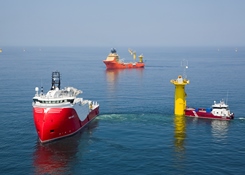
Maritime Research Strategy 2025
On 1rst January 2018, the “Maritime Research Strategy 2025” comprising the two new funding measures “Maritime Research Programme” and “Real-time Technologies for Maritime Safety” replaced the predecessor programme “Maritime Technologies of the Next Generation”.
Maritime Research Programme
The maritime economy is of central importance to the federal government’s economic policy. Experiences with research and development as a foundation for overcoming future challenges and ensuring competitiveness have consistently been positive. This has convinced the federal government to continue assuring continuity in research funding. The core of the successful previous funding instrument is incorporated into the new programme. The four prominent pillars of technology remain core elements: marine engineering, production technology, navigation and marine technology. The objectives and focal areas have been tailored to the new requirements.
From digitalisation to energy and mobility transformation – the speed of development necessitates more cross-sector approaches and tailored funding instruments. This is why four interdisciplinary topics have been included in the Maritime Research Strategy for the first time:
• MARITIME.green – environmentally-friendly maritime technologies
• MARITIME.smart – maritime digitalisation and smart technologies
• MARITIME.safe – maritime safety
• MARITIME.value – maritime resources
With the new edition of the "Maritime Research Programme" funding guideline in 2023, a further funding priority was added: Climate-neutral shipping is the focus of the climate-neutral ship priority (MARITIME.zeroGHG). In addition to research and development for climate-neutral shipping over the entire ship life cycle, including maritime production, investments in connection with R&D are eligible for funding.
The "Real-time Technologies for Maritime Safety" funding line addresses innovative real-time-capable systems for increasing civil maritime safety and security.
PtJ is certified according to DIN EN ISO 9001: 2015 and ISO 27001 based on IT-Grundschutz

